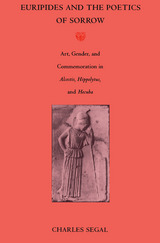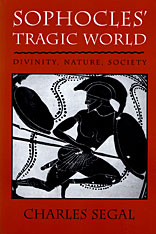
Alcestis, Hippolytus, and Hecuba, the three early plays interpreted here, are linked by common themes of violence, death, lamentation and mourning, and by their implicit definitions of male and female roles. Segal shows how these plays draw on ancient traditions of poetic and ritual commemoration, particularly epic song, and at the same time refashion these traditions into new forms. In place of the epic muse of martial glory, Euripides, Segal argues, evokes a muse of sorrows who transforms the suffering of individuals into a "common grief for all the citizens," a community of shared feeling in the theater.
Like his predecessors in tragedy, Euripides believes death, more than any other event, exposes the deepest truth of human nature. Segal examines the revealing final moments in Alcestis, Hippolytus, and Hecuba, and discusses the playwright's use of these deaths--especially those of women--to question traditional values and the familiar definitions of male heroism. Focusing on gender, the affective dimension of tragedy, and ritual mourning and commemoration, Segal develops and extends his earlier work on Greek drama. The result deepens our understanding of Euripides' art and of tragedy itself.

This volume celebrates 100 years of Harvard Studies in Classical Philology. It contains essays by Harvard faculty, emeriti, currently enrolled graduate students, and most recent Ph.D.s. It displays the range and diversity of the study of the Classics at Harvard at the beginning of the twenty-first century.
Volume 100 includes: E. Badian, “Darius III”; D. R. Shackleton Bailey, “On Statius’ Thebaid”; Brian W. Breed, “Silenus and the Imago Vocis in Eclogue 6”; Wendell Clausen, “Propertius 2.32.35–36”; Kathleen Coleman, “Missio at Halicarnassus”; Stamatia Dova, “Who Is μακάρτατος in the Odyssey?”; Casey Dué, “Tragic History and Barbarian Speech in Sallust’s Jugurtha”; John Duffy and Dimiter Angelov, “Observations on a Byzantine Manuscript in Harvard College Library”; Mary Ebbott, “The List of the War Dead in Aeschylus’ Persians”; Gloria Ferrari, “The Ilioupersis in Athens”; José González, “Musai Hypophetores: Apollonius of Rhodes on Inspiration and Interpretation”; Albert Henrichs, “Drama and Dromena: Bloodshed, Violence, and Sacrificial Metaphor in Euripides”; Alexander Hollmann, “Epos as Authoritative Speech in Herodotos’ Histories”; Thomas E. Jenkins, “The Writing in (and of) Ovid’s Byblis Episode”; Christopher Jones, “Nero Speaking”; Prudence Jones, “Juvenal, the Niphates, and Trajan’s Column (Satire 6.407–412)”; Leah J. Kronenberg, “The Poet’s Fiction: Virgil’s Praise of the Farmer, Philosopher, and Poet at the End of Georgics 2”; Olga Levaniouk, “Aithôn, Aithon, and Odysseus”; Nino Luraghi, “Author and Audience in Thucydides’ Archaeology. Some Reflections”; Gregory Nagy, “‘Dream of a Shade’: Refractions of Epic Vision in Pindar’s Pythian 8 and Aeschylus’ Seven against Thebes”; Corinne Ondine Pache, “War Games: Odysseus at Troy”; David Petrain, “Hylas and Silva: Etymological Wordplay in Propertius 1.20”; Timothy Power, “The Parthenoi of Bacchylides 13”; Eric Robinson, “Democracy in Syracuse, 466–412 B.C.”; Charles Segal, “The Oracles of Sophocles’ Trachiniae: Convergence or Confusion?”; Zeph Stewart, “Plautus’ Amphitruo: Three Problems”; Sarolta A. Takàcs, “Politics and Religion in the Bacchanalian Affair of 186 B.C.E.”; R. J. Tarrant, “The Soldier in the Garden and Other Intruders in Ovid’s Metamorphoses”; Richard F. Thomas, “A Trope by Any Other Name: ‘Polysemy,’ Ambiguity, and Significatio in Virgil”; Michael A. Tueller, “Well-Read Heroes Quoting the Aetia in Aeneid 8”; and Calvert Watkins, “A Distant Anatolian Echo in Pindar: The Origin of the Aegis Again.”

Volume 97 of Harvard Studies in Classical Philology is a special issue, entitled “Greece in Rome,” comprising revised versions of papers presented at a Loeb Classical Conference on the question of the Greek influence on Roman culture, with a particular though not exclusive emphasis on the Augustan period. The papers reflect the complexity of the relationship between the cultures involved—Greek, Roman, and Italic—and span many fields: history, literature, philosophy, linguistics, religion, and the visual arts.
Contributors include: G. W. Bowersock, “The Barbarism of the Greeks”; John Scheid, “Graeco Ritu: A Typically Roman Way of Honoring the Gods”; Calvert Watkins, “Greece in Italy outside Rome”; Gisela Striker, “Cicero and Greek Philosophy”; Brad Inwood, “Seneca in His Philosophical Milieu”; Bettina Bergmann, “Greek Masterpieces and Roman Recreative Fictions”; Elaine K. Gazda, “Roman Sculpture and the Ethos of Emulation: Reconsidering Repetition”; Ann Kuttner, “Republican Rome Looks at Pergamon”; Cynthia Damon, “Greek Parasites and Roman Patronage”; Richard F. Thomas, “Vestigia Ruris: Urbane Rusticity in Virgil’s Georgics”; R. J. Tarrant, “Greek and Roman in Seneca’s Tragedies”; Christopher P. Jones, “Graia Pandetur ab Urbe”; Albert Henrichs, “Graecia Capta: Roman Views of Greek Culture”; and Sarolta A. Takács, “Alexandria in Rome.”


Much has been written about the heroic figures of Sophocles’ powerful dramas. Now Charles Segal focuses our attention not on individual heroes and heroines, but on the world that inspired and motivated their actions—a universe of family, city, nature, and the supernatural. He shows how these ancient masterpieces offer insight into the abiding question of tragedy: how one can make sense of a world that involves so much apparently meaningless violence and suffering.
In a series of engagingly written interconnected essays, Segal studies five of Sophocles’ seven extant plays: Ajax, Oedipus Tyrannus, Philoctetes, Antigone, and the often neglected Trachinian Women. He examines the language and structure of the plays from several interpretive perspectives, drawing both on traditional philological analysis and on current literary and cultural theory. He pays particular attention to the mythic and ritual backgrounds of the plays, noting Sophocles’ reinterpretation of the ancient myths. His delineation of the heroes and their tragedies encompasses their relations with city and family, conflicts between men and women, defiance of social institutions, and the interaction of society, nature, and the gods. Segal’s analysis sheds new light on Sophocles’ plays—among the most widely read works of classical literature—and on their implications for Greek views on the gods, moral life, and sexuality.

This major new interpretation makes use of a structuralist analysis of Greek culture to probe the meaning of Sophoclean tragedy. After developing a theoretical framework which encompasses much of early Greek literature and tragedy, Mr. Segal provides a close reading of the seven extant plays, with special attention to style, form, and character. The book yields new understanding of Sophocles' poetic and dramatic art and also achieves a coherent statement of Sophocles' view of the human condition and implicit definition of civilization. Mr. Segal shows in the plays the relation of man to his potential savagery, the suspension of the hero between the extremes of animal violence and quasi-divine greatness, the relation of tragic heroism to social norms, ritual, and communication.
This thorough rereading of Sophocles will well serve students of Greek thought and poetry as well as those interested in seeing literature against a background of myth and ritual.
READERS
Browse our collection.
PUBLISHERS
See BiblioVault's publisher services.
STUDENT SERVICES
Files for college accessibility offices.
UChicago Accessibility Resources
home | accessibility | search | about | contact us
BiblioVault ® 2001 - 2024
The University of Chicago Press









